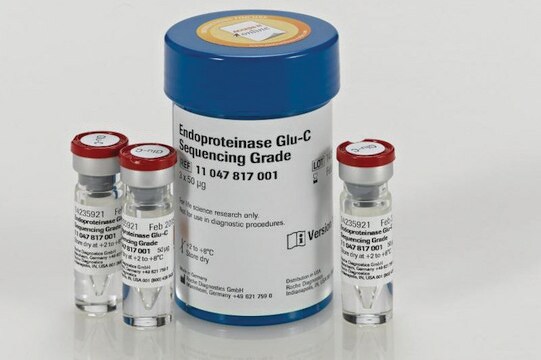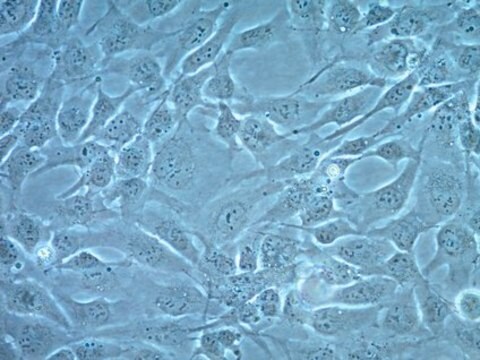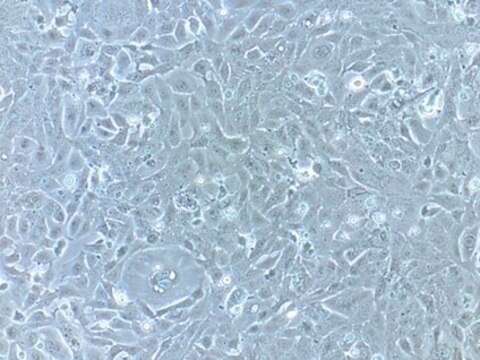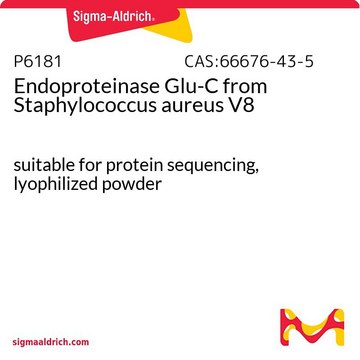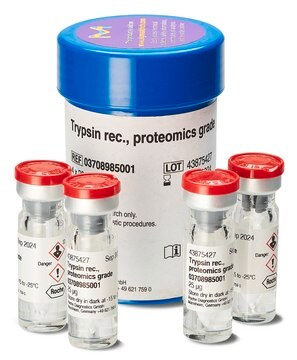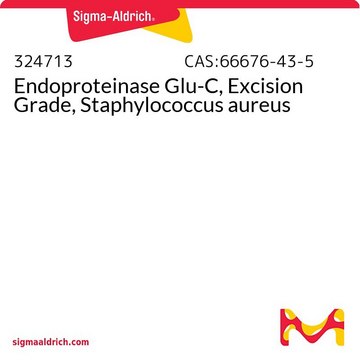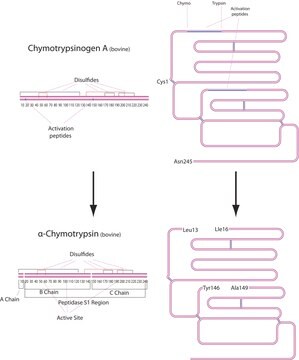Wszystkie zdjęcia(1)
Kluczowe dokumenty
ENDOARGS-RO
Roche
Endoproteinase Asp-N Sequencing Grade
from Pseudomonas fragi
Synonim(y):
protease
Zaloguj sięWyświetlanie cen organizacyjnych i kontraktowych
About This Item
Polecane produkty
Próba
≥90% (SDS-PAGE)
Formularz
lyophilized
aktywność właściwa
≥20000 units/mg protein
masa cząsteczkowa
27 kDa
opakowanie
pkg of 2 μg (11420488001)
pkg of 3 × 2 μg (11054589001)
producent / nazwa handlowa
Roche
optymalne pH
7.0-8.0
zakres pH
6.5-9.0
temp. przechowywania
2-8°C
Opis ogólny
The wild type of Pseudomonas fragi segregates a metalloprotease, which cleaves peptide bonds N-terminally at small hydrophilic amino acids. A mutant of this strain produces the Endoproteinase Asp-N Sequencing Grade, which is isolated as a highly purified and specific protease.
Specyficzność
Endoproteinase Asp-N Sequencing Grade is a metalloprotease. In phosphate, acetate, or Tris buffers at pH 6.0–8.5, it specifically cleaves peptide bonds N-terminally at aspartic and cysteic acid. If cysteine is reduced or alkylated, only -↓-Asp-X is cleaved.
The specificity of Endoproteinase Asp-N Sequencing Grade is verified with glucagon as a substrate. High concentrations of Endoproteinase Asp-N Sequencing Grade (1 part by weight enzyme with 10 parts by weight glucagon) are incubated to detect traces of impurities like contaminating proteases.
Heat inactivation: The protease is stopped by boiling for 5 minutes.
The specificity of Endoproteinase Asp-N Sequencing Grade is verified with glucagon as a substrate. High concentrations of Endoproteinase Asp-N Sequencing Grade (1 part by weight enzyme with 10 parts by weight glucagon) are incubated to detect traces of impurities like contaminating proteases.
Heat inactivation: The protease is stopped by boiling for 5 minutes.
Zastosowanie
Use Endoproteinase Asp-N Sequencing Grade for protein structure analysis and sequence analysis.
Uwaga dotycząca przygotowania
Working concentration: 2 μg /50 μl double-dist. water
One vial (= 2 μg enzyme) is dissolved in 50 μl double-dist. water resulting in a buffer concentration of 10 mM Tris-HCl pH 7.5.
Working solution: Recommended solvent is double-distilled water.
Storage conditions (working solution): -15 to -25 °C
A solution in double-dist. water is stable for 1 week at maximum at 2 to 8 °C and for about 1 month at -15 to -25 °C; repeated thawing should be avoided.
One vial (= 2 μg enzyme) is dissolved in 50 μl double-dist. water resulting in a buffer concentration of 10 mM Tris-HCl pH 7.5.
Working solution: Recommended solvent is double-distilled water.
Storage conditions (working solution): -15 to -25 °C
A solution in double-dist. water is stable for 1 week at maximum at 2 to 8 °C and for about 1 month at -15 to -25 °C; repeated thawing should be avoided.
Rekonstytucja
Lyophilized Endoproteinase Asp-N sequencing grade is reconstituted in 50 μl double-dist. water. This results in a buffer concentration of 10 mM Tris-HCl, pH 7.5. In order to avoid autolysis the incubation temperature should not exceed 37 °C.
Inne uwagi
For life science research only. Not for use in diagnostic procedures.
Ta strona może zawierać tekst przetłumaczony maszynowo.
Kod klasy składowania
11 - Combustible Solids
Klasa zagrożenia wodnego (WGK)
WGK 1
Temperatura zapłonu (°F)
does not flash
Temperatura zapłonu (°C)
does not flash
Wybierz jedną z najnowszych wersji:
Masz już ten produkt?
Dokumenty związane z niedawno zakupionymi produktami zostały zamieszczone w Bibliotece dokumentów.
Klienci oglądali również te produkty
Ming-Ming Li et al.
Nature communications, 4, 1832-1832 (2013-05-16)
Regulation of actomyosin dynamics by post-transcriptional modifications in cytoplasmic actin is still poorly understood. Here we demonstrate that dioxygenase ALKBH4-mediated demethylation of a monomethylated site in actin (K84me1) regulates actin-myosin interaction and actomyosin-dependent processes such as cytokinesis and cell migration.
Javier Fernandez-Martinez et al.
The Journal of cell biology, 196(4), 419-434 (2012-02-15)
The nuclear pore complex (NPC) is a multiprotein assembly that serves as the sole mediator of nucleocytoplasmic exchange in eukaryotic cells. In this paper, we use an integrative approach to determine the structure of an essential component of the yeast
Nasz zespół naukowców ma doświadczenie we wszystkich obszarach badań, w tym w naukach przyrodniczych, materiałoznawstwie, syntezie chemicznej, chromatografii, analityce i wielu innych dziedzinach.
Skontaktuj się z zespołem ds. pomocy technicznej
